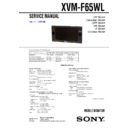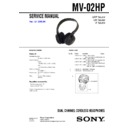Sony XMM-R5WL / XVM-F65WL Service Manual ▷ View online
SERVICE MANUAL
Sony Corporation
e Vehicle Group
Published by Sony Engineering Corporation
Published by Sony Engineering Corporation
US Model
Canadian Model
AEP Model
UK Model
E Model
Chinese Model
MOBILE MONITOR
9-879-756-02
2005H04-1
© 2005.08
© 2005.08
Ver. 1.1 2005.08
SPECIFICATIONS
XVM-F65WL
Monitor XVM-F65WL
System
System
Liquid crystal colour display
Drive system
TFT-LCD active matrix system
Picture size
6.5 inches wide screen (16:9)
143.4
143.4
× 79.3 mm, 165.1 mm (w/h, d)
Picture segment
280,800 (w 1,200
× h 234) dots
Power requirements
12 V DC car battery (negative ground)
Current drain
Approx. 1 A
Dimensions
194
× 101 × 27.1 mm (w/h/d)
(7
3/4
× 4 × 1
1/8
in.)
Operating temperature
0
°C – 45 °C
Mass
Approx. 424 g (15 oz)
Connection box XA-126 (AEP, UK model),
XA-125 (US, Canadian, E, Chinese model)
A/V Output
Output Impedance:less than 470
Ω
less than 1,000 pF
Output Level:
0 dBs
±0.3 dB (0.775 V rms)
Video:
75
Ω 1 Vp-p
A/V Input
× 2
Input Impedance: more than 10 k
Ω
less than 1,000 pF
Input Level (max.):1.3 dBs +0/–0.3 dB (1 V rms)
Video:
Video:
75
Ω 1 Vp-p
Dimensions
147.5
× 40 × 80 mm (w/h/d)
(5
7/8
× 1
5/8
× 3
1/4
in.)
Mass
Approx. 282 g (10 oz)
Card remote commander RM-X709
Power requirements
Power requirements
CR2025 lithium battery
Operable range
Approx. 2.5 m
Dimensions
55
× 125 × 15 mm (w/h/d)
Mass
Approx. 40 g
(including batteries)
(including batteries)
Headphones (US, Canadian model)
Modulation system
Modulation system
Frequency modulation
Carrier frequency
Right:
2.8 MHz (CH1)/3.8 MHz (CH2)
Left:
2.3 MHz (CH1)/3.2 MHz (CH2)
Frequency response
18 – 22,000 Hz
Power source
DC 3.0 V; using R6 dry batteries (2)
Mass
Approx. 230 g
(including batteries)
(including batteries)
• This set consists of the following units.
AEP, UK model
US, Canadian model E, Chinese model
MONITOR
XVM-F65WL
XVM-F65WL
XVM-F65WL
CONNECTION BOX
XA-126
XA-125
XA-125
REMOTE COMMANDER
RM-X709
RM-X709
RM-X709
CORDLESS HEADPHONES
——
MV-02HP
——
– Continued on next page –
2
XVM-F65WL
Supplied accessories
Installation kit (1)
Monitor stand (1) (AEP, UK, E, Chinese model)
(with supplied screws (5))
Connection box XA-126 (1) (AEP, UK model)
Connection box XA-125 (1)
(US, Canadian, E, Chinese model)
Cordless headphones MV-02HP (1)
(US, Canadian model)
Rechargeable battery MV-100BAT (1)
(AEP, UK, E, Chinese model)
Battery rechargeable cable (1)
(AEP, UK, E, Chinese model)
Card remote commander RM-X709
(with supplied battery) (1)
Power supply cord (1)
Detach cradle (3 m) (1)
Cigar plug (0.3 m) (1)
Operating Instructions (1 set)
Monitor stand (1) (AEP, UK, E, Chinese model)
(with supplied screws (5))
Connection box XA-126 (1) (AEP, UK model)
Connection box XA-125 (1)
(US, Canadian, E, Chinese model)
Cordless headphones MV-02HP (1)
(US, Canadian model)
Rechargeable battery MV-100BAT (1)
(AEP, UK, E, Chinese model)
Battery rechargeable cable (1)
(AEP, UK, E, Chinese model)
Card remote commander RM-X709
(with supplied battery) (1)
Power supply cord (1)
Detach cradle (3 m) (1)
Cigar plug (0.3 m) (1)
Operating Instructions (1 set)
Design and specifications are subject to change
without notice.
without notice.
TABLE OF CONTENTS
1.
SERVICING NOTES
................................................
3
2.
GENERAL
Location of Controls ........................................................
4
Connections .....................................................................
6
3.
DISASSEMBLY
3-1.
Cabinet (Rear) Assy .........................................................
9
3-2.
Monitor Board .................................................................
9
3-3.
LCD1 ............................................................................... 10
4.
TEST MODE
............................................................... 11
5.
ELECTRICAL ADJUSTMENTS
5-1.
Equipment Used .............................................................. 12
5-2.
Connection of Equipment ................................................ 12
5-3.
Setup for Adjustment ....................................................... 12
5-4.
DC-DC Converter Adjustment ........................................ 12
5-4-1. Frequency Adjustment ............................................. 12
5-4-2. 5V Voltage Adjustment ............................................ 12
5-4-3. Other Voltage Checks ............................................... 12
5-5.
5-4-2. 5V Voltage Adjustment ............................................ 12
5-4-3. Other Voltage Checks ............................................... 12
5-5.
PLL Adjustment .............................................................. 12
5-6.
Inverter High Voltage Check ........................................... 13
5-6-1. Voltage Check .......................................................... 13
5-6-2. Frequency Check ..................................................... 13
5-7.
5-6-2. Frequency Check ..................................................... 13
5-7.
OSD Dot Clock Check .................................................... 13
5-8.
NTSC Subcarrier Check .................................................. 13
5-9.
PAL Subcarrier Check ..................................................... 13
5-10. F0 Frequency Adjustment ............................................... 13
5-10-1. 3.2/3.8 MHz (CH2) Adjustment ............................ 13
5-10-2. 2.3/2.8 MHz (CH1) Check ..................................... 13
5-11. V COM Voltage/Position Adjustment ............................. 13
5-12. Video Adjustment ............................................................ 14
5-12-1. Brightness Signal Contrast Level (Y GAIN) ......... 14
5-12-2. Black Limiter Level Adjustment ............................ 14
5-12-3. White Limiter Level Adjustment ........................... 14
5-12-4. R Sub Brightness Adjustment ................................ 14
5-12-5. B Sub Brightness Adjustment ................................ 14
5-12-6. R Sub Contrast Adjustment ................................... 14
5-12-7. B Sub Contrast Adjustment ................................... 15
5-12-8.
5-10-1. 3.2/3.8 MHz (CH2) Adjustment ............................ 13
5-10-2. 2.3/2.8 MHz (CH1) Check ..................................... 13
5-11. V COM Voltage/Position Adjustment ............................. 13
5-12. Video Adjustment ............................................................ 14
5-12-1. Brightness Signal Contrast Level (Y GAIN) ......... 14
5-12-2. Black Limiter Level Adjustment ............................ 14
5-12-3. White Limiter Level Adjustment ........................... 14
5-12-4. R Sub Brightness Adjustment ................................ 14
5-12-5. B Sub Brightness Adjustment ................................ 14
5-12-6. R Sub Contrast Adjustment ................................... 14
5-12-7. B Sub Contrast Adjustment ................................... 15
5-12-8.
γ 1 Adjustment ....................................................... 15
5-12-9.
γ 2 Adjustment ....................................................... 15
5-12-10. VCO Free Run Adjustment .................................... 15
5-12-11. V POS Adjustment ................................................. 15
5-12-12. H POS Adjustment ................................................. 15
5-12-11. V POS Adjustment ................................................. 15
5-12-12. H POS Adjustment ................................................. 15
6.
DIAGRAMS
6-1.
Block Diagram –Connection Box Section– .................... 17
6-2.
Block Diagram –Video Section– ..................................... 18
6-3.
Block Diagram –Display Section– .................................. 19
6-4.
Printed Wiring Board –Connection Box Section– .......... 22
6-5.
Schematic Diagram –Connection Box Section (1/2)– .... 24
6-6.
Schematic Diagram –Connection Box Section (2/2)– .... 25
6-7.
Printed Wiring Boards –Monitor Section– ...................... 26
6-8.
Schematic Diagram –Monitor Section (1/4)– ................. 28
6-9.
Schematic Diagram –Monitor Section (2/4)– ................. 29
6-10. Schematic Diagram –Monitor Section (3/4)– ................. 30
6-11. Schematic Diagram –Monitor Section (4/4)– ................. 31
6-11. Schematic Diagram –Monitor Section (4/4)– ................. 31
7.
EXPLODED VIEWS
7-1.
Cabinet (Rear) Section .................................................... 38
7-2.
Cabinet (Front) Section ................................................... 39
7-3.
Connection Box Unit ....................................................... 40
7-4.
Cradle Section ................................................................. 41
8.
ELECTRICAL PARTS LIST
.................................. 42
•
UNLEADED SOLDER
Boards requiring use of unleaded solder are printed with the lead-
free mark (LF) indicating the solder contains no lead.
(Caution: Some printed circuit boards may not come printed with
free mark (LF) indicating the solder contains no lead.
(Caution: Some printed circuit boards may not come printed with
the lead free mark due to their particular size.)
: LEAD FREE MARK
Unleaded solder has the following characteristics.
• Unleaded solder melts at a temperature about 40
• Unleaded solder melts at a temperature about 40
°C higher than
ordinary solder.
Ordinary soldering irons can be used but the iron tip has to be
applied to the solder joint for a slightly longer time.
Soldering irons using a temperature regulator should be set to
about 350
Ordinary soldering irons can be used but the iron tip has to be
applied to the solder joint for a slightly longer time.
Soldering irons using a temperature regulator should be set to
about 350
°C.
Caution: The printed pattern (copper foil) may peel away if the
heated tip is applied for too long, so be careful!
• Strong viscosity
Unleaded solder is more viscous (sticky, less prone to flow)
than ordinary solder so use caution not to let solder bridges
occur such as on IC pins, etc.
than ordinary solder so use caution not to let solder bridges
occur such as on IC pins, etc.
• Usable with ordinary solder
It is best to use only unleaded solder but unleaded solder may
also be added to ordinary solder.
also be added to ordinary solder.
SAFETY-RELATED COMPONENT WARNING!!
COMPONENTS IDENTIFIED BY MARK 0 OR DOTTED LINE
WITH MARK 0 ON THE SCHEMATIC DIAGRAMS AND IN
THE PARTS LIST ARE CRITICAL TO SAFE OPERATION.
REPLACE THESE COMPONENTS WITH SONY PARTS WHOSE
PART NUMBERS APPEAR AS SHOWN IN THIS MANUAL OR
IN SUPPLEMENTS PUBLISHED BY SONY.
WITH MARK 0 ON THE SCHEMATIC DIAGRAMS AND IN
THE PARTS LIST ARE CRITICAL TO SAFE OPERATION.
REPLACE THESE COMPONENTS WITH SONY PARTS WHOSE
PART NUMBERS APPEAR AS SHOWN IN THIS MANUAL OR
IN SUPPLEMENTS PUBLISHED BY SONY.
Notes on Chip Component Replacement
• Never reuse a disconnected chip component.
• Notice that the minus side of a tantalum capacitor may be damaged
• Never reuse a disconnected chip component.
• Notice that the minus side of a tantalum capacitor may be damaged
by heat.
Ver. 1.1
3
XVM-F65WL
SECTION 1
SERVICE NOTES
NOTE FOR REPLACEMENT OF THE EEP ROM (IC403)
The EEP ROM (IC403) contains all data by which the LCD screen is defined.
When the EEP ROM is replaced, the normal LCD screen will not appear.
It is then necessary to write the data into the EEP ROM.
When the EEP ROM is replaced, the normal LCD screen will not appear.
It is then necessary to write the data into the EEP ROM.
Writing Method:
1. Turn on power to the connection box XA-125/126.
2. Press the [POWER] key on the set to turn on the set.
1. Turn on power to the connection box XA-125/126.
2. Press the [POWER] key on the set to turn on the set.
(Normal LCD screen doesn’t appear because there is no data in EEP ROM.)
3. Press the [RESET] key while pressing the [INPUT] and [VOL--] keys on the set.
4. Press the [VOL--] key on the remote controller for more than 2 seconds.
5. The EEP ROM data will be written and the normal test mode screen will appear.
4. Press the [VOL--] key on the remote controller for more than 2 seconds.
5. The EEP ROM data will be written and the normal test mode screen will appear.
After this, perform V COM voltage/position adjustment as well as VIDEO adjustment.
NOTE FOR REPLACEMENT OF THE SYSTEM CONTROL (IC401)
When the IC401 is replaced, the video system should be set again according to the destinations.
Setting Method:
1. Enter the test mode. (See page 11).
2. Select NTSC/PAL SELECT from the test mode menu.
3. Set the video system to the appropriate mode for each destination by using the [MENU] key.
1. Enter the test mode. (See page 11).
2. Select NTSC/PAL SELECT from the test mode menu.
3. Set the video system to the appropriate mode for each destination by using the [MENU] key.
Video mode
Destination
NTSC 2.4G PACK
US, Canadian
PAL 2.4G PACK
E, Chinese
PAL RGB 2.4G PACK
AEP, UK
Ver. 1.1
4
XVM-F65WL
SECTION 2
GENERAL
This section is extracted
from instruction manual.
from instruction manual.
6
7 8
4
3
2
Location of controls
Monitor
*
If interference occurs while using several cordless headphones
If several monitors are installed and used simultaneously, interference may occur.
If several monitors are installed and used simultaneously, interference may occur.
1 INPUT button
Press to select the input source.
2 Receptor for the card remote
commander/Transmitter for the
cordless headphones*
cordless headphones*
3 MENU button
Press to make various settings.
4 DIMMER button
Press to switch the dimmer on/off.
(When it is set to On, the display
darkens.)
(When it is set to On, the display
darkens.)
5 POWER (on/off) button
Press to turn on/off the monitor.
6 VOLUME +/– buttons
Press to turn up or down the volume
(The default volume level is 25.) or
to select the item during menu
operation.
(The default volume level is 25.) or
to select the item during menu
operation.
7
8 Monaural speaker
8 Monaural speaker
RESET button
1
5
6


